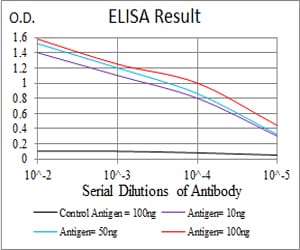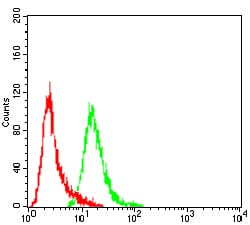

| WB | 咨询技术 | Human,Mouse,Rat |
| IF | 咨询技术 | Human,Mouse,Rat |
| IHC | 咨询技术 | Human,Mouse,Rat |
| ICC | 技术咨询 | Human,Mouse,Rat |
| FCM | 1/200 - 1/400 | Human,Mouse,Rat |
| Elisa | 1/10000 | Human,Mouse,Rat |
| Aliases | FMS; CSFR; FIM2; HDLS; C-FMS; CD115; CSF-1R; M-CSF-R |
| Entrez GeneID | 1436 |
| clone | 4C9G2 |
| WB Predicted band size | 108kDa |
| Host/Isotype | Mouse IgG1 |
| Antibody Type | Primary antibody |
| Storage | Store at 4°C short term. Aliquot and store at -20°C long term. Avoid freeze/thaw cycles. |
| Species Reactivity | Human |
| Immunogen | Purified recombinant fragment of human CSF1R (AA: 20-152) expressed in E. Coli. |
| Formulation | Purified antibody in PBS with 0.05% sodium azide |
+ +
以下是3篇关于CSF1R抗体的代表性文献,涵盖其机制与应用研究:
---
1. **文献名称**: *CSF1R inhibition with emactuzumab enhances chemotherapy efficacy in human osteosarcoma*
**作者**: Gomez-Roca CA, et al.
**摘要**: 该研究探讨了抗CSF1R单抗emactuzumab联合化疗治疗骨肉瘤的效果,发现其通过抑制肿瘤相关巨噬细胞(TAMs)的招募,增强化疗药物渗透性并抑制肿瘤生长,为靶向TAMs的联合治疗提供了依据。
---
2. **文献名称**: *Anti-CSF1R monoclonal antibody therapy targeting tumor-associated macrophages: From mechanisms to clinical potential*
**作者**: Ries CH, et al.
**摘要**: 系统综述了抗CSF1R抗体的作用机制,包括阻断CSF1/CSF1R信号通路以减少促肿瘤M2型巨噬细胞,并总结了其在实体瘤(如乳腺癌、胶质瘤)中的临床试验进展及免疫微环境调控潜力。
---
3. **文献名称**: *CSF1R-specific antibodies enhance phagocytosis of amyloid-β by microglia and ameliorate Alzheimer’s-like pathology in mice*
**作者**: Spangenberg EE, et al.
**摘要**: 研究显示,靶向CSF1R的抗体可通过激活小胶质细胞的吞噬功能,促进阿尔茨海默病模型小鼠脑内Aβ斑块的清除,同时抑制神经炎症,为神经退行性疾病的免疫治疗提供了新思路。
---
这些文献分别从癌症联合治疗、机制综述及神经疾病干预角度,展示了CSF1R抗体的多样化应用前景。
The colony-stimulating factor 1 receptor (CSF1R), also known as CD115 or c-FMS, is a tyrosine kinase receptor primarily expressed on monocytes, macrophages, and other myeloid lineage cells. It binds to its ligands, CSF-1 and interleukin-34 (IL-34), triggering downstream signaling pathways (e.g., PI3K-AKT, MAPK) that regulate cell survival, proliferation, differentiation, and immune function. CSF1R plays a critical role in maintaining tissue-resident macrophages and shaping the tumor microenvironment (TME), where tumor-associated macrophages (TAMs) often promote immunosuppression, angiogenesis, and metastasis.
CSF1R-targeting antibodies are therapeutic or research tools designed to block receptor activation, thereby inhibiting CSF1R-dependent signaling. In cancer, these antibodies aim to deplete or reprogram TAMs to counteract their pro-tumorigenic effects, potentially enhancing anti-tumor immunity. Clinical studies have explored CSF1R antibodies in solid tumors, such as tenosynovial giant cell tumor (TGCT), leading to FDA approval of agents like pexidartinib (a small-molecule inhibitor). In autoimmune and inflammatory diseases (e.g., rheumatoid arthritis), CSF1R blockade may suppress pathogenic macrophage activity.
Challenges include balancing therapeutic efficacy with systemic effects, as CSF1R signaling is essential for homeostatic functions, including bone remodeling and CNS maintenance. Current research focuses on optimizing antibody specificity, combination therapies (e.g., with checkpoint inhibitors), and biomarker-driven patient stratification. CSF1R antibodies thus represent a promising yet complex strategy for modulating myeloid cells in disease contexts.
×